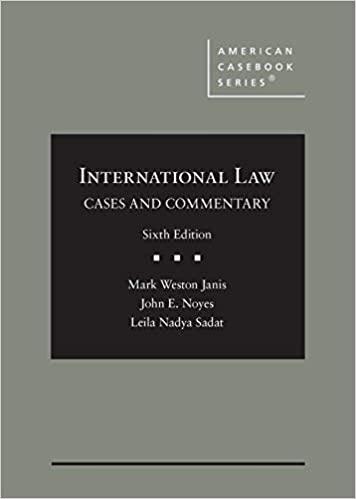Answered step by step
Verified Expert Solution
Question
1 Approved Answer
CHOOSE THE MOST APPROPRIATE ANSWER. In respect of the Hague Convention on the Civil Aspects of International Child Abduction a court may choose not to
CHOOSE THE MOST APPROPRIATE ANSWER. In respect of the Hague Convention on the Civil Aspects of International Child Abduction a court may choose not to return a child if one of the following defenses is proved. Choose the most appropriate answer from the options below. 1.All options provided here are correct. 2.The return would cause the child a grave risk of physical or psychological harm or an intolerable situation. 3.The child objects to being returned, and is mature enough to do so. 4.The petitioner was not actually exercising custody rights at the time. 5.The person who wants the child back (the petitioner) consented or acquiesced to the removal/retention. Which of the following is not an advantage of marriage in community of property? 1.Each spouse automatically shares in the assets that are accumulated during the subsistence of the marriage. 2.Antenuptial assets are also shared. 3.It applies by operation of law without an antenuptial contract having to be executed and therefore requires no effort or expense on the part of prospective spouses. 4.The creditworthiness of husband and wife is the same during the subsistence of the marriage. 5.Whatever assets each spouse amassed prior to the marriage is not shared. Tom has been married to Elizabeth for the past six years. Unfortunately, Elizabeth was diagnosed with a mental illness a year ago. Tom is unable to cope with Elizabeth's situation and wants out of the marriage. Which of the following options provides the correct legal position? 1.Tom does not meet the jurisdictional grounds required to successfully rely on s 5(1) of the Divorce Act. 2.Tom may not seek a divorce against Elizabeth as the provisions of s 9(1) bar such a course. 3. Tom may not rely on the ground of the irretrievable breakdown of the marriage between the parties. 4. Tom may rely on section 5(1) of the Divorce Act in order to obtain a divorce decree. 5. Tom is bound by the marriage vows that he and Elizabeth exchanged during the solemnisation of their marriage. He vowed to take care of Elizabeth in sickness and in health. Section 4(1) of the Divorce Act provides: A court may grant a decree of divorce on the ground of the irretrievable breakdown of a marriage if it is satisfied that the marriage relationship between the parties to the marriage has reached such a stage of disintegration that there is no reasonable prospect of the restoration of a normal marriage relationship between them. In terms of the decision in Levy v Levy 1991 (3) SA 614 (A), the word "may" in the provision above indicates that: 1. the court may decide on the factors it considers sufficient enough to warrant a decree of divorce. 2. the court has a discretion to refuse to grant a divorce decree. 3. the provision is an empowering provision that gives the court the power which it otherwise did not enjoy. It places a duty on the court to grant a decree once the plaintiff proves a valid ground. 4. the provision must be interpreted in light of the facts of each case. If the case is one where the facts show that the court must exercise its discretion in deciding whether to grant a decree of divorce, the court enjoys such discretion. 5. if the parties are not agreed on the granting of the divorce decree, only the high court has a discretion on whether to issue such a decree
Step by Step Solution
There are 3 Steps involved in it
Step: 1

Get Instant Access to Expert-Tailored Solutions
See step-by-step solutions with expert insights and AI powered tools for academic success
Step: 2

Step: 3

Ace Your Homework with AI
Get the answers you need in no time with our AI-driven, step-by-step assistance
Get Started


